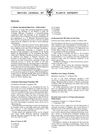 13 citations,
August 2005 in “Dermatologic Clinics”
13 citations,
August 2005 in “Dermatologic Clinics” Doctors should consider psychological factors when treating skin conditions and work with mental health experts.
18 citations,
January 1988 in “Acta oncologica” Retinol palmitate may reduce cancer relapses in early-stage lung cancer patients.
31 citations,
January 2008 in “Gynecological endocrinology” Both birth control pills improved hormone levels and skin conditions in women with hyperandrogenism, but the one with drospirenone was more effective.
27 citations,
October 1991 in “International journal of gynaecology and obstetrics” Flutamide effectively reduces hair growth in women with hirsutism and improves acne and seborrhea without side effects.
138 citations,
January 2004 in “AIDS” Some HIV treatments can harm mitochondria, potentially causing side effects like lactic acidosis and nerve damage.
March 2023 in “Journal of Cosmetic Dermatology” Trichoscopy is effective for diagnosing scalp ACC in darker skin tones.
 60 citations,
January 1987 in “Dermatology”
60 citations,
January 1987 in “Dermatology” Alopecia areata may appear differently depending on the individual's type of hair loss and scalp condition.
 4 citations,
November 2021 in “Frontiers in endocrinology”
4 citations,
November 2021 in “Frontiers in endocrinology” Children and adults with Cushing's disease show different symptoms and males have more severe cases; surgery outcomes can be predicted by certain factors.
 17 citations,
November 2002 in “Australasian Journal of Dermatology”
17 citations,
November 2002 in “Australasian Journal of Dermatology” Saw palmetto causes allergic reaction, minoxidil causes skin irritation; use cautiously for hair loss.
 January 2023 in “Skin appendage disorders”
January 2023 in “Skin appendage disorders” A woman's hair grew back after treatment for a rare hair loss caused by proton therapy.
 May 2024 in “Internattional journal of current innovation in advance research”
May 2024 in “Internattional journal of current innovation in advance research” Lifestyle changes like a healthy diet, exercise, and proper sleep can help manage PCOD.
 6 citations,
October 1997 in “CNS Drugs”
6 citations,
October 1997 in “CNS Drugs” Psychotropic drugs can cause hair loss or excessive hair growth.
 December 1997 in “British Journal of Plastic Surgery”
December 1997 in “British Journal of Plastic Surgery” The document lists plastic surgery events and opportunities from 1997, including awards, workshops, and conferences.
 1 citations,
November 2023 in “Journal of the European Academy of Dermatology and Venereology”
1 citations,
November 2023 in “Journal of the European Academy of Dermatology and Venereology” Baricitinib helps with early hair regrowth in people with alopecia areata.
36 citations,
February 2004 in “Veterinary Dermatology” Lymphangiosarcoma was confirmed in cats with specific skin symptoms using a lymphatic marker.
 18 citations,
March 2000 in “PubMed”
18 citations,
March 2000 in “PubMed” Hair loss significantly affects European men's self-esteem and concern about aging, with these feelings being common across four countries.
 May 2017 in “Endocrine Abstracts”
May 2017 in “Endocrine Abstracts” Testosterone levels are not linked to erectile dysfunction in young and middle-aged men with HIV.
 6 citations,
January 2020 in “The Aging Male”
6 citations,
January 2020 in “The Aging Male” Testosterone replacement therapy improved blood sugar and fat levels without raising prostate cancer risk in Japanese men with low testosterone.
 May 2023 in “Journal of Applied Cosmetology”
May 2023 in “Journal of Applied Cosmetology” The Annurca apple supplement significantly improved hair growth in people with hair loss.
13 citations,
June 2006 in “Fertility and Sterility” Nonclassic 21-hydroxylase deficiency is a common, treatable genetic disorder causing reversible symptoms like acne and hair loss.
 16 citations,
July 1986 in “Dermatology”
16 citations,
July 1986 in “Dermatology” Using minoxidil lotion for hair regrowth in androgenetic alopecia has limited success and should be evaluated carefully.
 21 citations,
November 2022 in “Frontiers in immunology”
21 citations,
November 2022 in “Frontiers in immunology” Sebaceous glands play a key role in skin health, immunity, and various skin diseases.
10 citations,
February 2017 in “European journal of neuroscience/EJN. European journal of neuroscience” The availability of certain hormones and specific stimulation patterns affect long-term synaptic changes in the male rat brain.
8 citations,
July 2004 in “Journal of morphology” Marsupial hair structure and keratin distribution are similar to placental mammals.
28 citations,
June 2010 in “Pediatric dermatology” Short anagen syndrome causes short hair that may grow longer after puberty.
 3 citations,
September 2022 in “Frontiers in psychiatry”
3 citations,
September 2022 in “Frontiers in psychiatry” University students in Egypt experienced high stress during COVID-19's third wave, with negative coping mechanisms being more common.
 12 citations,
June 2003 in “Journal of the European Academy of Dermatology and Venereology”
12 citations,
June 2003 in “Journal of the European Academy of Dermatology and Venereology” Some psychoactive drugs can cause skin reactions, with carbamazepine having a higher risk, and stopping the drug and seeing a dermatologist is important.
 April 2024 in “Frontiers in medicine”
April 2024 in “Frontiers in medicine” Alopecia Areata significantly lowers quality of life and current treatments are inadequate, highlighting a need for better therapies and standardized treatment protocols.
 22 citations,
May 1999 in “International Journal of Dermatology”
22 citations,
May 1999 in “International Journal of Dermatology” Hair loss from genetics and hormones can be treated with drugs or surgery.



















